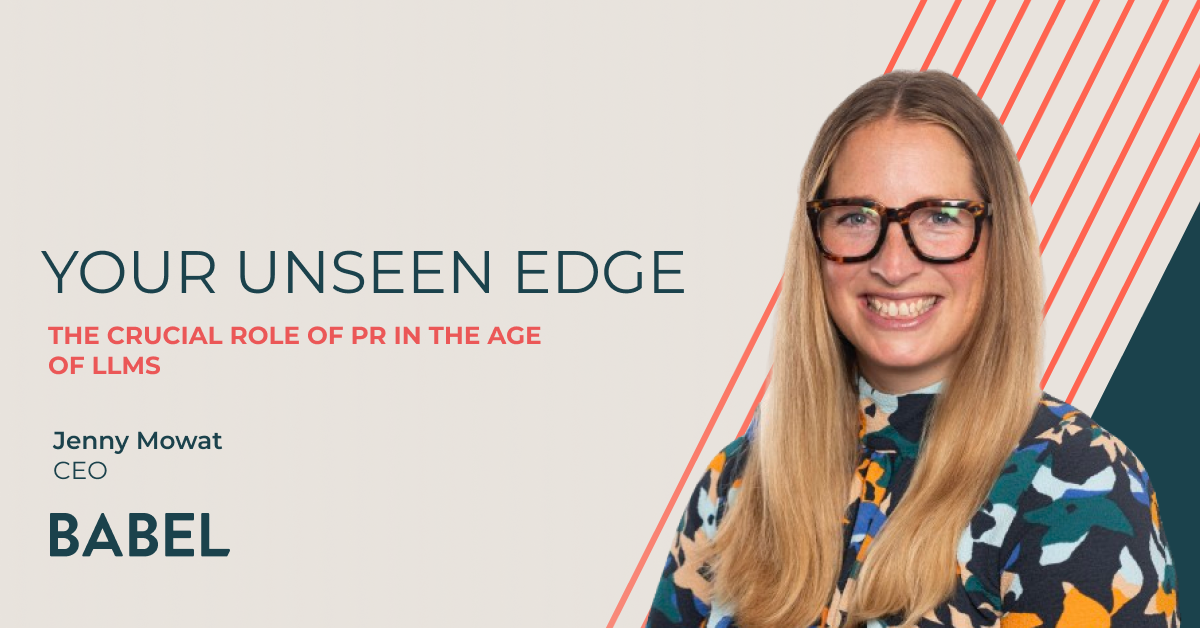AI in PR - will our kids be able to follow our career paths? I asked mine to find out
I won't reveal the exact year that I did my work experience while at school, but you can probably guess that the words "Twitter" and "Facebook" were mere figments in the imaginations of their as-yet-unknown founders, and print remained the dominant form of media.
When it came to where I would spend my week away from school one summer term, I had two options - my Mum was a teacher at an all-girls Catholic school, so that was immediately out of the question. My Dad was an engineer at a heavily secure oil facility - again, not exactly a child-friendly environment. I ended up doing some gardening - a week of back-breaking work that filled me with zero inspiration to pursue a career in landscaping.
In truth, I was always destined for an office-based job. English (language rather than literature) was my passion at school and university, and after a few years in journalism, I landed in PR. After 17 years working both in-house and agency-side (which I reflected on in a recent episode of Babel's podcast), I've seen some massive shifts in the PR sector. The obvious wholesale change has been the result of increased digitisation. Whereas I used to start my day sifting through the papers and photocopying articles of interest, now I receive email alerts relating to client coverage and read the numerous newspaper apps on my mobile phone.
The methods by which PR professionals consume the news are just one of the ways in which technology has changed our roles. PR is clearly not the only sector to have undergone massive digital-led changes over the past decade. On the other side of the PR/journalism fence, the media sector has perhaps seen an even bigger revolution as a result of tech enhancements. The pace of change is set for even greater acceleration in the coming years. Why? Yes, you guessed it, artificial intelligence (AI).
One of the often-cited benefits of the increased use of AI in the workplace is greater automation of tasks, removing monotony and creating happier employees who can instead focus on more fulfilling activities. The pessimistic (or realistic?) viewpoint is that AI advancements will reduce the need for human involvement in certain industries. This week the OECD said that more than a quarter of jobs in the region rely on skills that could be easily automated by AI. A spokesperson said that, while there is little evidence that the emergence of AI is having a significant impact on jobs so far, that may be because the revolution is still in its early stages.
That is certainly the case in PR. We are starting to see increased use of generative AI, both in the creation of text and images. And the potential is huge. You can hear more about that potential in a conversation I recently had for Babel's Digital Communicators podcast with Andrew Bruce Smith, Chair of the CIPR's AI in PR group. However, as of yet, AI has not cost any PR professional their job. While that may be the case, you can easily see how, based on the huge advancements in AI over just the last 6-12 months, within the next 5-10 years organisations and agencies could easily be choosing to invest in more cost-effective AI platforms rather than employing an individual.
The prospect of AI replacing humans in the workplace is unlikely to worry many of those teenagers who will be the young employees of 2030. It certainly isn't a concern for my 15- and 13-year-old sons, who are far too busy focusing on when they are next allowed on their PlayStation. So, when the time came for their work experience weeks away from school, I grabbed the opportunity to give them a glimpse of life in PR and how AI may impact the industry, and the wider world of work, when the time comes for them to start their careers.
Harrison (15) and Ruari (13) recently joined me on the train to London for a day at the Babel office. They seemed to be excited at the prospect of a day in the city and a few hours playing games on their laptops without the fear of a teacher giving them detention. That excitement turned to surprise when I told them they would be doing actual work. Their task for the day would be to write a blog on the topic of "Will I still be able to get a job in PR in 5 years or will AI have taken over?"
After a few hours of desk research and speaking with colleagues, I was pleasantly surprised at the diligence they both showed and the quality of the output (the bribe of a trip to McDonalds may have had something to do with their enthusiasm). In summary, here is a quick teenager's guide to AI and how it may impact the PR sector (their words, not mine!):
The earliest substantial work in the field of artificial intelligence was done in the mid-20th century by the British logician and computer pioneer Alan Mathison Turing. He said that "the goal of AI is to provide software that can reason on input and explain on output".
There are a range of benefits of using AI in the PR Industry. It is more efficient than people because it is quicker. This could help because AI could write a pitch in ten minutes, but humans could possibly write it in around 60 to 90 minutes. AI can help PR because it can review and refine writing, instead of a person going through the writing and editing it themselves.
From our research, we believe that you will still be able to get a job in PR in five years - AI will not have taken over by then. It may take more than ten years for AI to have a significant impact, with workers being made redundant from their job.
So, there you have it. We are safe until at least 2028, meaning we have five years to prove our worth as PR professionals. If not, the bots will completely take over.
To end on a serious note, it is encouraging that the sector is proactively considering how AI will benefit our industry and enable us to add greater value to our clients to ensure we continue to deliver outstanding results. All Babel clients have been sent our new AI policy. At the heart of this policy is a focus on ethics, transparency and accountability.
I have no doubt that AI will have a growing, beneficial impact on our professional lives, and I am looking forward to seeing how it can enhance our services. At the same time, I am confident that the sector will continue to offer those leaving education over the next decade a rewarding and enjoyable career path for many years to come.


.jpg)








